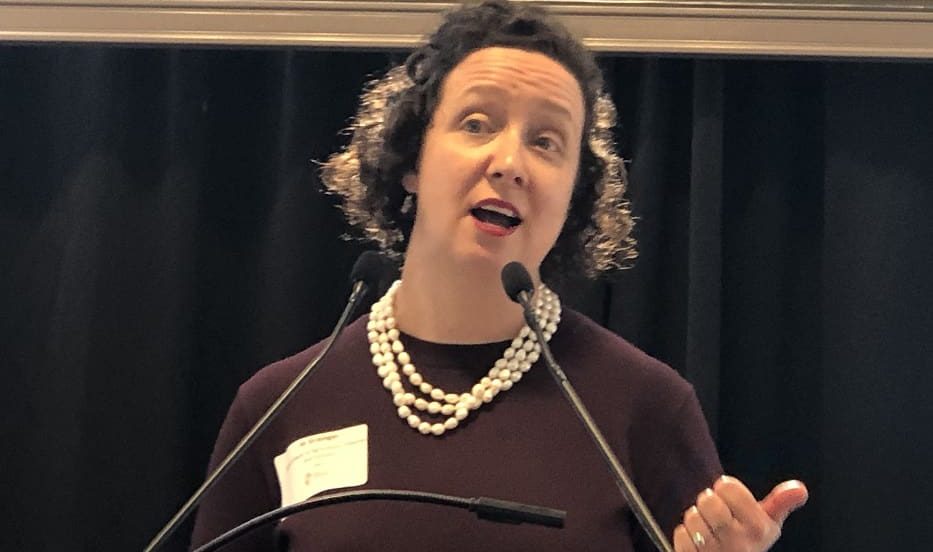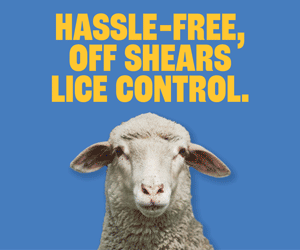
DAFF;s Jo Grainger at the sustainability framework report launch.
A EUROPEAN Union-wide ban on mulesing is “not unlikely” and making importing product competitors conform with EU animal welfare regulations was seen as a future market development, LambEx conference delegates were told in Adelaide recently.
Speaking at the launch of the Australian Sheep Sustainability Framework’s fourth annual report at LambEx, senior Federal Government trade executive Jo Grainger said the sustainability credentials of Australian sheep producers supplying product to EU would become increasingly important.
“Whether you are exporting wool or lamb to the EU market, the sustainability credentials of your product are important now and will become increasingly important – not just to keep up with your competitors in market, but potentially just to access the market,” she said.
Ms Grainger is the assistant secretary of the trade and international division at the Department of Agriculture Fisheries and Forestry, supporting Australia’s agricultural trade outcomes in bilateral and multilateral fora.
From December 2020 and January 2023 she was Australia’s minister counsellor – agriculture, based in Brussels Belgium leading Australia’s agricultural trade relationship with Europe. Prior to this she worked on industry policy across the wool, dairy, wine, grains, sugar, horticulture, cotton and small emerging industries.
Ms Grainger gave the LambEx delegates a detailed insight into the regulatory changes underway in the EU and their importance to Australian sheep producers.
Pain relief is mandatory and EU ban on mulesing ‘not unlikely’
She said although mulesing for flystrike is not commonly used in the EU, it is expressly banned in certain member states.
“As you all well know EU animal welfare NGOs have run several campaigns over the years to stop EU retailers buying wool from mulesed sheep and they also attempted to make it an issue during the EU FTA talks.
“Pain relief is already mandatory in the EU for any procedure likely to cause significant pain and it is not unlikely that we will see an EU-wide ban on mulesing as part of this legislative change that is coming,” she said.
But Ms Grainger said the changes are “not coming tomorrow”, and there will be a long transition period, probably out to 2035, because the legislative proposals are still in development and being negotiated and there will be a transition phase before changes are adopted.
It’s not clear how they will impose this at the border and they can also be captured in market certification programs, she said.
Ms Grainger said social license is an issue in the EU and the negative perception of mulesing helped by NGO campaigns has been used by those opposed to trade against Australian access into the EU. She cited the July 2021 European Citizens’ Initiative’s ‘End the Cage Age’ petition that collected more than 1.4 million signatures to end the use of cages in animal farming.
Ms Grainger said wool falls under the EU’s Green Claims Directive and the Ecodesign for Sustainable Products Regulation (ESPR), with the aim of implementing minimum sustainability requirements that could include controls on the inputs used on farms.
“The Green Claims legislations aims to end greenwashing and the whole point is that when an EU customer goes into a store and reads a label, they can believe the label.”
 Ms Grainger said DAFF and the Australian sheep industry believe the EU’s Product Environmental Footprint method completely undervalues natural fibres and they have been working to raise their concerns with the EU. The Make The Label Count campaign funded by AWI and the IWTO has been effective in the market and government wanted to see that continue, she said.
Ms Grainger said DAFF and the Australian sheep industry believe the EU’s Product Environmental Footprint method completely undervalues natural fibres and they have been working to raise their concerns with the EU. The Make The Label Count campaign funded by AWI and the IWTO has been effective in the market and government wanted to see that continue, she said.
Ms Grainger said the recent EU Parliament elections did not really change the situation, but meant the European Green Deal is probably going to slow down, but neither it nor the farmer support strategy would end.
“It is more likely that the agricultural sector will get more of a say in policy development….. but this is the direction of travel for the EU.”
Sustainability claims to come under increasing scrutiny
She said a common cry from EU farmers during recent protests was that they were not operating on a level playing field.
“They’re saying ‘we have to meet all these rules, we can’t possibly compete with imports that are of a lower standard’ and everything coming into the EU is of a lower standard, according to the EU farmers.”
Mr Grainger said sustainability claims are coming under further EU scrutiny and would be subject to audits.
“You’ll need to make and have comprehensive evidence for the claims.”
She said although the EU is moving faster than other markets in regard to regulation, “other markets will pick up some of these as well, so diverting to an alternate market may not always save you.”
However, she said “of course” Australian farmers are better placed than other to seize the opportunities in the EU and deliver on their sustainability credentials.
“We need to be able to tell our story, deliver evidence — our credentials — and continue to push for a more holistic view of sustainability and no one size fits all model.
“And if we do that we will get our market access right in years to come and the sheep sustainability framework is a key tool for us to do that.”
Will EU take meat or wool from mulesed sheep systems?
When asked if to guarantee EU access in the future, Australian sheep producers selling wool or sheep meat will not be able to mules their sheep, either the mother of the lamb or the lambs, Ms Grainger said: “It is certainly the case that there is strong pressure from the EU textile industry to look for non-mulesed wool.”
“I don’t think we are at the point yet where I would say that mulesed wool won’t have a market there, but I think it is an increasing trend.
“And I think if we can move to a position where, if you do have to mules, it’s with mandatory pain relief we’re on really strong ground,” she said.
“I know Victoria has moved to that model and it will be interesting to see how other states go.”
Ms Grainger said the animal welfare organisations in Europe understood the devastating impact of flystrike and EU ag NGOs understood mulesing was “about care and animal welfare,” but wanted to see changes in sheep breeding to negate mulesing.
She said applying pain relief for sheep procedures was a strong consumer perspective in the EU, although very disconnected to the animal husbandry and production sector.
Mulesing ‘not really a meat product practice’
Ms Grainger said “we (DAFF) are very clear to explain that mulesing isn’t really a meat product practice necessarily.”
“It can happen, but certainly for instance when we had Su McCluskey a special representative for Australian agriculture, she was actually in the UK talking to the UK Parliament and explaining the Australian production systems and she got questions about mulesing to those parliamentarians and she was able to explain that.
“They heard direct from an Australian farmer about the commitment to sustainability and the commitment to animal health welfare and they were some very compelling words and ultimately that parliamentary committee wrote a report to the government to encourage them to support the FTA,” Ms Grainger said.
After her LambEx presentation, Ms Grainger told Sheep Central that mulesing only comes up in the context of wool in the EU.
When asked if the fact that almost all first cross ewes – a common prime lamb mother in Australia – were mulesed would ultimately affect the EU access of Australian sheep meat, Ms Grainger said Australian product is certified to meet market requirements and she is not aware if non-mulesing is a requirement of that certification.
“I think it’s more a case of we pride ourselves in Australia in meeting market requirements.”
Ms Grainger said the EU animal welfare standards are being updated, but have not been finalised and the question is what will the EU impose at its border.
She said EU regulators wanted to impose a range of rules on their own farmers and one way to sell that to the farmers was tell them that competitors will be made to meet those standards.
It is hard to see how that can be achieved on animal welfare standards, “but it doesn’t mean they’re not going to try”, Ms Grainger said.
“We see that as a future market development.”
An AuctionsPlus analysis of sheep and lambs lambs sold online in 2016/17 found that 67 percent of all ewes sold, 68pc of hoggets and 31pc of lambs were mulesed. Of the non-mulesed lambs, 25pc were Merinos and 75pc were crossbreds, and 83pc of the mulesed lambs were Merinos. Eleven percent of new season lambs were mulesed.

What a load of garbage.
For Jo Grainger to put her head in the sand and say the EU are not really worried about mulesing other than for wool is absurd.
I believe there will come a time when the EU says ‘we don’t want any Australian sheep products as they mules’ and in our operation we don’t. This will include meat, meat by products, skins, wool etc .
The domestic meat market will be affected too unless we get some decent leadership.
This inactivity to mandate an end to mulesing by the hierarchy of the sheep industry will cost us dearly.
Who is going to pay?
This article shows how disconnected some people are from reality.
Check out an article posted on Sheep Central on September 27th, 2017, “ Sheep Meat Council of Australia declares prime lambs should not be mulesed”.
The current situation with sheep meat quotas with the EU is Australia’s share 5000 tonnes (farm gate value $35,000,000) New Zealand’s share 114,000 tonnes (farmgate value $798,000,000). It’s illegal to mules lambs in New Zealand. We would be naive to think that FTA negotiations wouldn’t have this mentioned.
Amazing how many times I hear it mentioned that it’s more of a wool industry issue than a meat issue. The minute lambs and sheep leave our property to be processed into a meat product there is no traceability regarding their mulesing and pain relief management status on our National Vendor Declaration, whereas our wool is traceable on the NWD.
Twenty years ago, along with two other industry leaders I had a meeting with one of Australia’s major meat processors who told us that they couldn’t meet the animal welfare standards regarding mulesing into the EU, so they couldn’t fill the order.
Sustainably is mentioned throughout this article, but before we can have sustainability we need traceability as a priority.
Andrew
Well this is not unexpected. Australian wool growers and stud breeders have had over a decade to prepare for this. Had AWI shown leadership from the start and the industry had built on the genetic initiatives of Dr Jim Watts, 80 percent of the Merino flock today could have been non-mulesed. Instead AWI misled growers with market feedback about the depth of consumer concern about mulesing.
AWI is the only marketing organisation in the world that ignores the consumer. On that account alone, AWI must go.
It’s in the growers hands. Vote for zero wool tax and get this sad episode in Australian wool industry history over as quickly as possible.
Is this the emerging time of reckoning?
Didn’t someone say so long ago?
When is too late too late?